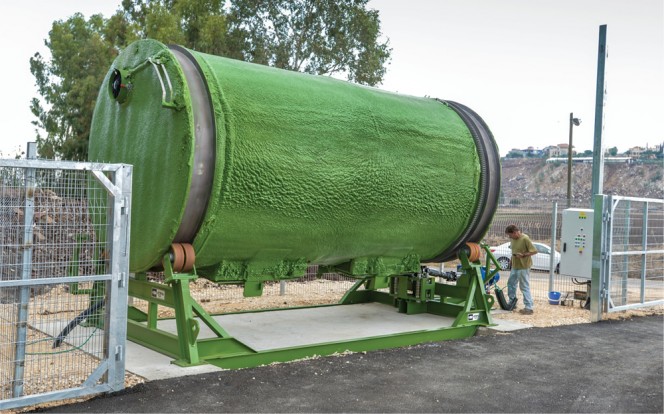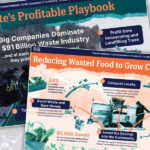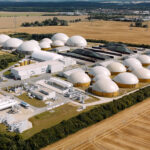The SCOW Project has been developing low-cost collection and composting systems for source separated organics in agro-tourism areas around the Mediterranean.
Dan Levanon, Ramón Plana and Gemma Nohales
BioCycle June 2015
Tourist regions with agricultural activity around the Mediterranean Sea are characterized by scattered small towns and villages, which are flooded by visitors during the tourist seasons. A 3-year project (2013-2015), “Selective Collection of Organic Waste (SCOW) in tourist areas and composting in small-scale plants,” has been developing low cost, technically simple and high quality organic waste stream collection and recycling models for implementation in these regions. Systems are based on source separation of organics and treatment in decentralized small-scale composting plants, located near where the waste is generated, and at the same time, near potential compost application areas. The main objective of the project is to provide tools, capacity and knowledge to transform organic waste into a resource: compost for soil amendment, instead of garbage that must be disposed.
SCOW participants are local authorities and organizations in: West Bank, Palestine (House of Water and Environment); Upper Galilee, Israel (Upper Galilee Regional Council); Malta (Local Councils’ Association); Province of Genoa, Italy (Development Agency Gal Genovese); Corsica, France (SYVADEC); and Catalonia, Spain (Urban Ecology Agency of Barcelona). These six regions have growing tourism businesses and important agricultural activity. The project is funded by the European Union through ENPI (European Neighbourhood and Partnership Instrument). It is within the Framework of the ENPI CBC MED Program (Cross Border Cooperation in the Mediterranean Programme), and coordinated by the Urban Ecology Agency of Barcelona, Spain. Two other participating organizations with professional roles are: MIGAL, Galilee Research Institute (Israel) and the Environment Park, Torino (Italy).
SCOW has a mission to share the project’s results and best practices in other Mediterranean countries, through cooperation with organizations from Greece, Tunisia and Morocco and the Association of Cities and Regions for Recycling and Sustainable Resource Management (ACR+) from Belgium among others. Implementation of all elements of the SCOW project is scheduled to take place until the end of 2015. At that time, all of the projects, as discussed in this article, will become operational.
Project Territories
Palestinian Authority: The Jericho municipality (eastern part of the West Bank/Jordan Valley) and Ramallah (central West Bank) have a number of tourist attractions in addition to the nearby agricultural lands. There are several open windrow composting plants for agricultural wastes, mainly cattle manure. Prior to SCOW there was no composting of municipal organic wastes.
Israel: The Upper Galilee is a major tourist region. In the Upper Galilee Regional Council (County), there are 29 cooperative settlements (“Kibbutz”) with 20,000 inhabitants. Each operates large-scale farms and a number of tourist businesses including hotels and daytime attractions. The kibbutz farms use compost that is primarily made of cattle manure, and mostly produced in the Galilee region. There is growing understanding of the benefits of compost use in the intensive Israeli agricultural community. The SCOW compost will be used in each kibbutz according to needs. The project will include development of six composting facilities that will serve as pilots and demonstration plants for all other settlements.
Malta: Malta is a popular tourist destination and the islands welcome more than one million tourists annually. Agriculture is also important, with farms comprising large parts of the islands. There are some small facilities in different locations equipped with electro-mechanical composters to treat municipal organics from single producers like fresh markets.
Italy: The Province of Genoa, in Liguria, is composed of the municipality of Genoa, the coastal area with 16 municipalities and the inner lands, with 51 municipalities. More than 1,000 farms are in the province. SCOW is covering a few municipalities that include agro-tourist farms. Small-scale food residuals composting sites exist in the country, but not in the province of Genoa. Farms also compost agricultural residuals.
France: The island of Corsica is an unusual mixture of tourism and agricultural regions, with farms located all over the island along with many tourist attractions. One composting site has been processing a mixture of winery wastes and chicken manure. The SCOW project will be mainly located in the area of Corte (Central Corsica), one of the biggest towns on the island.
Spain: There is significant inland tourism In the Catalonian territory, as well as beach tourism at the shore locations. The project will be located in Pallars Sobirà, a rural county in the Catalan East Pyrenees, an area with many disperse villages in a valley that is suitable for small local composting plants due to the organic streams generated and the rural features. Overall, the Catalonian region has 22 medium and large scale composting plants for source separated municipal organics, but none are in the remote mountainous Pallars Sobirà County.
Project Components
Methodology
SCOW conducted an initial comprehensive survey in each region to determine organic waste characteristics and existing waste management methods. In parallel, a general project management model was defined, based on a study of the “state of the art” in organic waste management in small communities using small-scale composting plants. The findings also were used to create a best practices database. Finally, different guidelines, operational protocols and facility management handbooks for implementation of each management model were created. These tools will facilitate the introduction and operation of organic waste collection and treatment systems to produce high agronomic value compost.
Management Model
It was determined that the design of a simple composting facility for food waste and other sources of organic waste streams, like agricultural residuals and by-products, should follow these concepts:
Flexibility: Ability to treat different sources of organics and accept varying waste quantities, according to seasonal (tourist seasons) waste generation amounts.
Decentralized: Small–scale to reduce hauling impact and cost of the finished compost, and create jobs in the region itself.
Knowledge: Facility operators know and understand the composting process to insure proper operation and good results.
Simple management/technology: Site is easily adapted to the conditions, characteristics and needs of the incoming feedstock.
Feedstock Quality/Source Separation: Only treat organics that contain very low (< 2%) concentrations of nonorganic impurities (glass, plastics, metals, etc.). To ensure this is achieved, implement source separation and door-to-door collection of organic wastes, from big producers (hotels, restaurants, fresh markets, etc.), as well as households.
The Mediterranean Basin is characterized by heterogeneous conditions such as weather, soils, organic waste composition and availability of complementary (bulking) materials; diverse needs/uses of compost; and different waste management and planning regulations, on a national and local basis. Those different circumstances oblige each SCOW partner to adapt and adopt an operation model (collection and treatment) that fits its local conditions. While the six regions will each use different operation schemes and composting systems, all will do source separation of the waste streams, mainly door-to-door collection, but also collection in specific containers and community composting (direct input of urban organic wastes in the composters).
Composting Systems
Three types of composting systems will be used:
Turned open windrows: Two sites are being built in Jericho and Ramallah for the Palestinian project. These sites will receive municipal waste (750 and 1,000 tons/year, respectively) as well as agricultural green wastes (olive and palm tree trimmings etc.) and cattle manure (90 and 700 tons/year respectively).
Aerated static piles in concrete bunkers: The Catalonian region’s regulations require use of forced aeration systems for composting of food residuals and organic wastes. Annual treatment capacity is for 750 tons of organic wastes.
Decentralized in-vessel composting: For the projects in Liguria (Italy), Corsica (France) and Malta, the choice was made to do composting in relatively small plants — 26 to 100 tons of organics annually — using in-vessel electro-mechanical composters. The decision was mainly due to the topography of the mountainous regions (Liguria and Corsica) with dispersed municipalities and waste producers, as well as national and local legislation and planning regulations (Malta). This system will be complemented with composting “modules” (composters with 1 cubic-meters capacity). These are simple systems that serve a few households or a single business as well as educational centers and other public facilities.
In Upper Galilee (Israel), small closed drum composters, with annual treatment capacity of 250 tons, will serve one or two settlements. This is to minimize hauling costs, maximize use of locally available bulking materials and enable local use of finished compost for gardening and agriculture.
Infrastructure Elements
The infrastructure elements of each SCOW project (composting plants, separation bins, collection vehicles, etc.) are being purchased and built during winter 2014 and summer 2015. Four composters in the Upper Galilee are already operating and the other two will be operating soon. In Corsica, a small-scale electro-mechanical composter has been operating since February 2015. In Catalonia, the composting facility is being built and will start to operate during summer 2015. Educational campaigns, stakeholders meetings, and training of households, schools and businesses (especially tourism-related) are underway. MIGAL has been producing the communication materials, which are translated in each region to the local language.
The vision of the SCOW project was to have local farmers manage the composting facility and use the finished compost. But involving the farming sector in urban food waste and scraps management was met with some constraints, including local laws and existing food waste management systems. Usually, waste collection and management of facilities are in the hands of the local authorities, which are naturally responsible for this service. Therefore, the local authorities have to decide, if and how the farmers will be involved. For example, in Israel, the regulations prohibit composting mixtures of food wastes and manure, which added another constraint.
Regardless, almost all of the composting facilities will be located in rural agricultural areas. The SCOW project will promote, when possible, involvement of local farmers in both facility management and compost utilization. Farmers will be trained in the composting process and use of finished compost as a soil amendment and fertilizer.
Monitoring Activities
The SCOW project will monitor the collection services’ quality and efficiency, the composting plants’ activity and the finished compost quantity, quality and destination. Management data will be collected through standardized monitoring forms created for the project and will be used to calculate the project’s results (indicators). Relevant data will be uploaded on a web-GIS system, with geo-localization of the project’s plants, a description of each facility and the monitored data. This system’s interactive map will enable users to visually explore the data from the project’s models and facilities and to compare results.
Guidelines for source separation, collection and composting were produced and are being adapted by each region/partner according to their local conditions. Other technical materials include a Handbook for small-scale composting facility management; Training Protocols for the operators and compost users; and a Good Practices database for urban waste treatment. The costs of urban waste treatment according to the SCOW treatment model, as compared to the conventional treatment, are being studied.
Dissemination and Capitalization
Various activities are underway to disseminate the SCOW project’s results, with more planned for the future. These include holding events in several locations within the Mediterranean basin; activation of links with other composting and waste treatment networks on related projects/topics; and strengthening cooperation with partner institutions and others in the waste treatment sector. This set of activities is complementary to the communication activities, including dissemination via social media networks developed during the project (see http://www.biowaste-scow.eu/). One of the main purposes of SCOW, based on its results, is to establish a Mediterranean composting network that will be a tool for transferring knowledge to help convince waste managers and experts to study and choose the most suitable treatment models based on the experience and know-how gained by the SCOW.
Dan Levanon is Professor for Biotechnology at Tel-Hai College and Senior research scientist at MIGAL-Galilee Research Institute, Israel. Ramón Plana has an Organic Wastes Management Consultancy in Barcelona, Spain, plana.compost@gmail.com. Gemma Nohales is with Urban Ecology Agency of Barcelona, Barcelona, Spain.











